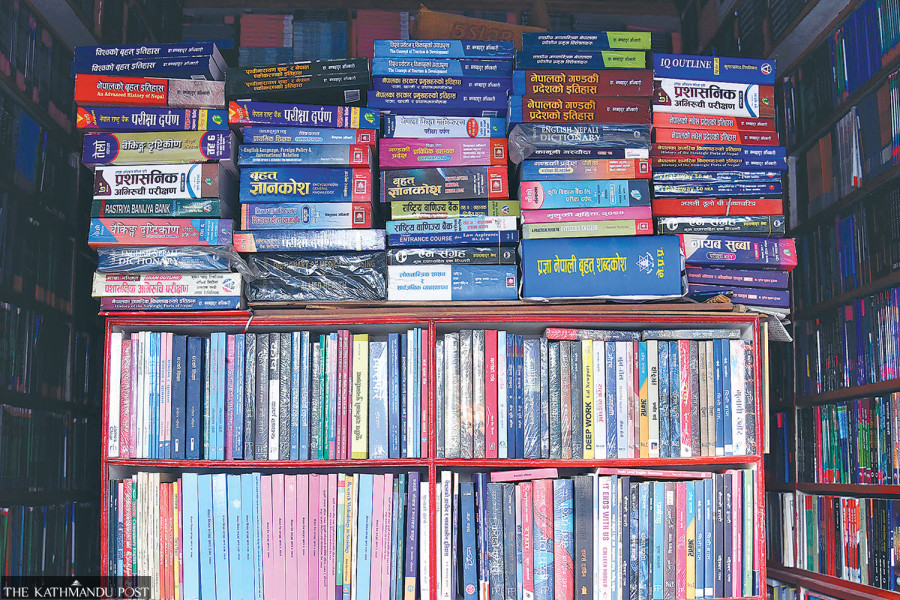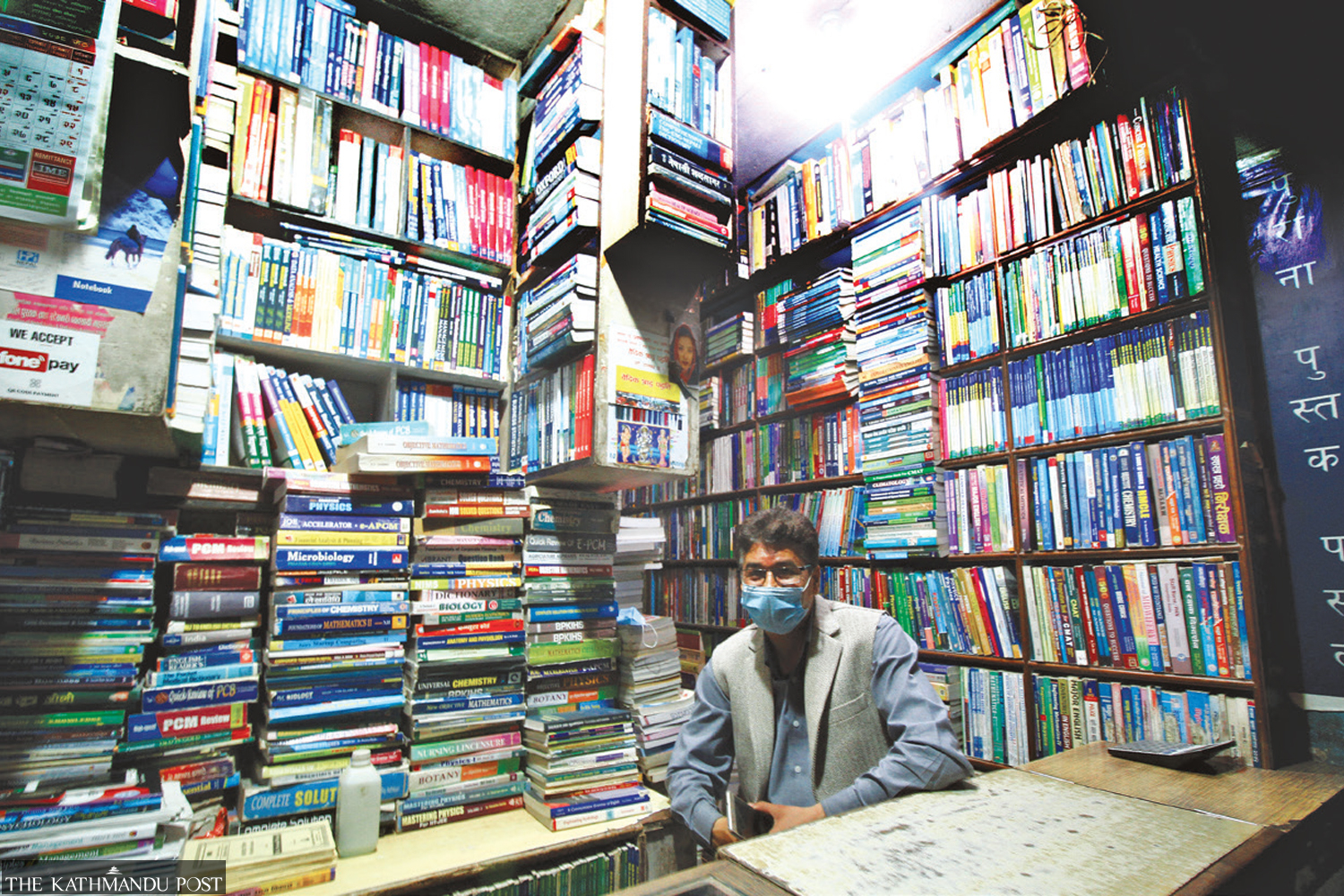Money
Ample resources online, frequent course updates hit second-hand bookstores
Students’ exodus leaves the once-thriving shops on Exhibition Road with few buyers.
Sarahna Khadka
In the bustling streets of the Exhibition Road area in downtown Kathmandu, students from nearby colleges hustle between their breaks to grab lunch at the roadside eateries and rush back to attend classes.
The eateries are busy and so are the stationery shops.
But there is a noticeable change nowadays. The once-thriving secondhand bookstores at the corners of Putalisadak streets now wear a deserted look. The Post visited several secondhand bookshops in Putalisadak, Thamel, Rani Pokhari and Bhotahiti areas. Their bookshelves are covered with dust, while some shelves are empty.
The sellers await customers, desperately.
“The demand for secondhand has dried up completely and we have resorted to selling first-hand only,” said Suresh Khatri, a salesperson at Unnati Book Store at Exhibition Road, which has been in operation for a decade.
Another secondhand bookshop nearby, Khada Devi Book Centre, used to do brisk business in the past.
Rabindra Bhattarai, its owner, says the business nowadays hardly breaks even.
“The demand dropped during the Covid lockdown, and it has not recovered to pre-pandemic levels.”
He said that the monthly rent has soared to Rs30,000 and increases by 5 percent a year.
It is already costly to operate secondhand book shops, and profit margins have also shrunk, he complained.
Secondhand books, particularly textbooks, were once appealing to students as they were cheaper by Rs150 to Rs200 than fresh copies. Students, too, used to sell their books.
As students have been leaving the country in massive numbers every year, this has affected secondhand book shops too.
Nepal’s rate of brain drain is unprecedented.
As many as 110,000 students acquired the No Objection Certificate (NOC), a permission issued by the Ministry of Education, to study abroad in the last fiscal year. This number doesn’t include the thousands of Nepali students enrolled in Indian academic institutions.
As many as 45,000 students have acquired permits to study abroad in the first five months of the current fiscal year.
These numbers indicate that another 100,000 students are ready to head overseas.
The drop in student numbers has alarmed not only colleges, but the education sector as a whole, including the stores selling old and new books and textbooks.
Frequent changes in university coursebooks too have affected secondhand shops.
“Since the courses have changed for many subjects now, books older than two years are irrelevant. So we need to stock up on updated versions,” said Bhattarai.
It’s true that the number of secondhand bookshops in the city has gone down markedly, and many that are still running are struggling to stay afloat.
“And the internet has everything,” said Bhattarai.
With e-books and online retailers emerging on the scene, these booksellers don’t see any future for the traditional brick-and-mortar bookstores.
In Kathmandu, the main Thamel area used to have many secondhand bookshops. Some older stores have moved to the Bagbazar area, where sales are a bit better, said Bhattarai.
For Binita Sapkota, a 3rd year BBA student at the Padma Kanya Campus, and a regular visitor to secondhand bookstores in past years, the internet has been a boon.
“Me and my friends have in the past used secondhand books. Now, there is no need, because everything is freely available online.”
For most secondhand bookstores, books for Grades 11 and 12 were in high demand.
In Thamel, Sagun Book Shop is one of the few remaining shops selling pre-owned books.
“There were about 16 such shops in this area. Now there are only three. Recently one store stopped selling books,” said Kiran Dev Ghimire, owner of the bookstore.
Ghimire has been running the store in Kathmandu’s tourist spot for the past 15 years.
“The customer base for used books usually is very limited. Only actual book lovers understand the essence of used books,” he said.
He said that while a lot of his customers are foreign tourists, occasionally, Nepalis from different parts of the country also visit his shop for some special books.
“We have some very rare books like those that are out of print now while some are copies signed by the authors. This makes them more valuable than any first-hand books,” said Ghimire.

Ghimire has now expanded his store to sell new books and gift items and also operates a photocopy and printing shop to keep the cash flowing.
“We cannot entirely rely on books. On a good day about 10 books might be sold. Some days there are no sales at all,” he said.
In the past, Ghimire’s bookshop was like a library. Nowadays, he is also into online sales.
“We tried to sell through online platforms like Sajha Books and HamroBazar, but that has not been very successful,” he said.
In Old Baneshwor, Hari Khadka, a Malaysia-returnee who opened a secondhand book store along with three other friends around seven years ago, is the only one still in business.
“My friends had bookshops in Sundhara. They shut down during lockdown. They relied solely on old books, so they could not survive. But I also sell stationery and other books so I have been able to pay the rent and meet the basic needs,” he said.
His store specialises in selling used course books for students.
He said that publishers are trying to reduce the circulation of used books in the market by regularly updating books.
“Many book publishers nowadays try to modify at least one chapter or question patterns, and if not, they just change the cover to make it seem that old editions of the same books are outdated,” he said.
“Also, teachers sometimes collaborate with publishers, and if the teacher is the author of the textbook, they put pressure on their students to buy the latest editions, so that they could earn a commission,” said Khadka.
Due to recent sales trends, he has been earning roughly Rs40,000 a month from the store.
But only a small portion of the income comes from books or used books. “The stationery items are the most profitable,” Khadka said.




 14.12°C Kathmandu
14.12°C Kathmandu













